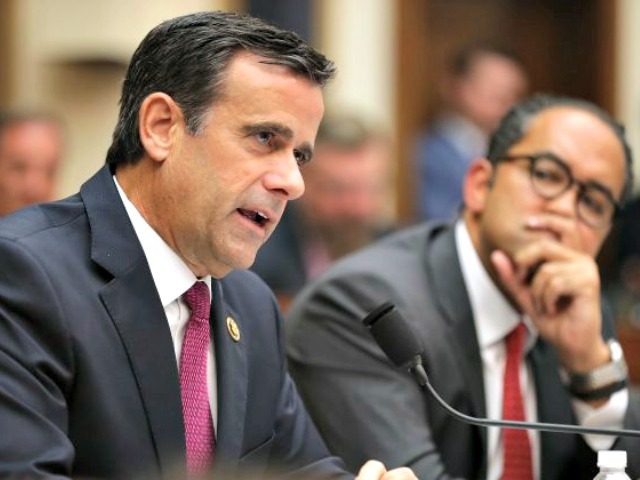Director of National Intelligence John Ratcliffe declassified intelligence on Tuesday that suggests Hillary Clinton’s presidential campaign had created a plan in July 2016 to frame then-candidate Donald Trump for Russian hacking — at least according to Russian intelligence.
The letter, which was sent in response to a query from Senate Judiciary Committee Chair Sen. Lindsey Graham (R-SC).
It states that in late July 2016 — at the time that Wikileaks released emails from the Democratic National Committee server, right before the Democratic National Convention in Philadelphia, Pennsylvania — the U.S. became aware that Russian intelligence alleged “that U.S. Presidential candidate Hillary Clinton had approved a campaign plan to stir up a scandal against U.S. Presidential candidate Donald Trump by tying him to [Russian President Vladimir] Putin and the Russians’ hacking of the Democratic National Committee.” The U.S. Intelligence Community (IC) did not know if it was true.
Ratcliffe adds that then-CIA Director John Brennan briefed President Barack Obama “and other senior national security officials” about the Russian intelligence. That apparently included an “alleged approval by Hillary Clinton on July 26, 2016 of a proposal from one of her foreign policy advisors to vilify Donald Trump by stirring up a scandal claiming interference by Russian security services.”
Finally, Ratcliffe notes that U.S. intelligence officials made an “investigative referral” to then-FBI Director James Comey and agent Peter Strzok — who was Deputy Assistant Director of Counterintelligence — about Hillary Clinton’s alleged approval of a plan to frame Trump for Russian hacking as a way of distracting attention from her e-mail scandal. (Clinton had used an illicit, unsecured private server for government emails, some of which included classified information. It was then destroyed.)
It is not clear whether any of the declassified intelligence is correct.
Holman Jenkins of the Wall Street Journal has long argued that Comey was spurred to intervene in the investigation of Clinton’s emails by an intercept of Russian intelligence that may have been a deliberate hoax by the Russians.
Jenkins wrote in May:
Then there is the intrigue that hasn’t been aired or disclosed, which remains hidden in a classified report by the Justice Department inspector general. This concerns the alleged Russian intelligence that FBI Director Comey used to justify his unprecedented, improper and insubordinate interventions in the Hillary Clinton email case.
I cannot stress too much the dereliction of the press since the flurry of disclosures in May 2017 by the New York Times, the Washington Post and CNN that Mr. Comey’s doings were triggered by a Russian intercept that his FBI colleagues believed to be false and possibly a plant.
This intelligence appeared to reveal named Democrats and Obama officials discussing a conspiracy to bury the Clinton investigation. Either Mr. Comey ignored this evidence and implicitly became party to the conspiracy’s alleged goal of liberating Mrs. Clinton from her email travails, or he exploited fabricated Russian intelligence to facilitate the same end.
What is known is that the Clinton deliberately and publicly accused of Russia of trying to help Trump — both before and after the election.
As Jonathan Allen and Amie Parnes wrote in their 2017 book Shattered: Inside Hillary Clinton’s Doomed Campaign, the Clinton campaign tried to draw attention to the Russia theory in the last month of the campaign, and immediately blamed Russia after Clinton’s loss.
Comey is set to testify before the Senate Judiciary Committee tomorrow as part of its investigation into Operation Crossfire Hurricane, the troubled inquiry into President Trump’s campaign.
Joel B. Pollak is Senior Editor-at-Large at Breitbart News and the host of Breitbart News Sunday on Sirius XM Patriot on Sunday evenings from 7 p.m. to 10 p.m. ET (4 p.m. to 7 p.m. PT). His newest e-book is The Trumpian Virtues: The Lessons and Legacy of Donald Trump’s Presidency. His recent book, RED NOVEMBER, tells the story of the 2020 Democratic presidential primary from a conservative perspective. He is a winner of the 2018 Robert Novak Journalism Alumni Fellowship. Follow him on Twitter at @joelpollak.

COMMENTS
Please let us know if you're having issues with commenting.